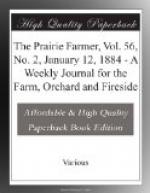The Iowa State Improved Stock Breeders’ Association had a good attendance at its annual meeting at Ames, last month.
SHEEP.
Hon. J. Kennedy read a paper on the subject “Will Sheep Breeding Pay.” Viewed from a financial point of view, he thought there had been no better financial results from any commodity than from the sheep—the wool and mutton—when given proper care and attention. Speculators and traffickers in wool and woolen goods were failing all over the country, but he attributed this to want of fitness for the business in which they were engaged. Though the present depression in the wool market was somewhat due to tariff tinkering, was more the result of over-production—greater supply than demand.
Mr. Grinnell said that at one time he was the owner of a flock of 6,000 sheep, but wool went down in price, and he did not think it profitable to keep so large a flock, and sold out.
Col. Lucas believed the owner of 160 acres of land could not do better than to put upon the tract at least 100 sheep.
Hon. E. Campbell had found the business profitable where flocks were fairly dealt with. He thought Iowa one of the best places in the world in which to raise sheep. He believed that both sheep and cattle could be profitably kept upon the same farm. His favorite cross is Cotswold and Merino. The average weight of fleece in his own flock was over six pounds.
SWINE.
Col. John Scott introduced the subject of swine by reading a compilation of historical facts regarding them. He presented drawings, showing the different breeds and the improvements made in them, in form and size.
Mr. Failor spoke of the Jersey-Reds as his favorite breed for docility and other essentials.
Prof. Knapp said the most profitable hogs are those with sound constitutions, good muscular systems, of early maturity, and in general made to resist diseases which prevail from time to time, all over the country.
Mr. Young said that when we want an animal for the farm, we must first look to soundness of constitution. Breed is not of so much consequence. A breed should not be run after merely because it is novel. He breeds Poland-Chinas. In order to gain the most prolific breeding, the sows of this breed should not be allowed to get too fat before dropping the first litter; simply keep them in good condition.
C.R. Smith thought early breeding injurious to the swine interests of the country.
H.W. Lathrop asserted that the forcing system of putting on meat had injured the constitutions of many of our breeds of hogs. In times past, when less pampering was in vogue and hogs were allowed wide range, there was less disease than now.
CATTLE.
Mr. Clarkson, of Des Moines, read a paper entitled “Plain and Practical Thoughts for Common Farmers.” It treated of the breeding and care of cattle.




